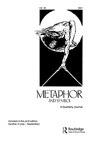“面对粉末”还是“粉脸”?当代隐喻理论与汉英翻译艺术
IF 3.3
3区 文学
0 LANGUAGE & LINGUISTICS
引用次数: 0
摘要
摘要本文探讨认知隐喻理论对诗歌翻译理论和实践的贡献。我们关注许渊冲的中英文翻译,既是因为他被视为中国首屈一指的翻译家之一,也是因为他发表了详细的翻译理论框架和理由。我们认为,徐的翻译理论和实践是建立在一种传统的比喻语言方法的基础上的,在这种方法中,隐喻被视为纯粹的装饰,没有添加独立的意义。通过识别中文原文和徐译文中潜在的概念隐喻和潜在的感知模拟,我们发现徐用隐喻代替了原诗中的隐喻(通常代替更稀疏、更模糊的语言),以有时微妙但在其他情况下相当惊人的方式改变和限制了潜在的含义。我们认为,当代认知语言学理论,特别是概念隐喻理论和感知模拟理论,对中国诗歌英译的创作和评价具有重要意义。本文章由计算机程序翻译,如有差异,请以英文原文为准。
To “Face the Powder” or “Powder the Face”? Contemporary Metaphor Theory and the Art of Chinese to English Translation
ABSTRACT In this article, we examine how cognitive metaphor theories might contribute to the theory and practice of poetry translation. We focus on translations from Chinese to English by Xu Yuanchong, both because he is regarded as one of China’s premier translators and because he has published a detailed theoretical framework and justification for his translations. We argue that Xu’s theory and practice of translation is based on a traditional approach to figurative language in which metaphor is regarded as purely decorative, adding no independent meaning. By identifying underlying conceptual metaphors and potential perceptual simulations in both the original Chinese and Xu’s translations, we show that the metaphors Xu substitutes for those in the original poem (often in place of sparser, more ambiguous language), changes and limits potential meanings in ways that are sometimes subtle but in other cases quite striking. We argue that contemporary cognitive linguistics theories, particularly Conceptual Metaphor Theory, and Perceptual Simulation Theory, can contribute in important ways both to creating and to evaluating translations of Chinese poetry into English.
求助全文
通过发布文献求助,成功后即可免费获取论文全文。
去求助
来源期刊

Metaphor and Symbol
Multiple-
CiteScore
2.90
自引率
0.00%
发文量
23
期刊介绍:
Metaphor and Symbol: A Quarterly Journal is an innovative, multidisciplinary journal dedicated to the study of metaphor and other figurative devices in language (e.g., metonymy, irony) and other expressive forms (e.g., gesture and bodily actions, artworks, music, multimodal media). The journal is interested in original, empirical, and theoretical research that incorporates psychological experimental studies, linguistic and corpus linguistic studies, cross-cultural/linguistic comparisons, computational modeling, philosophical analyzes, and literary/artistic interpretations. A common theme connecting published work in the journal is the examination of the interface of figurative language and expression with cognitive, bodily, and cultural experience; hence, the journal''s international editorial board is composed of scholars and experts in the fields of psychology, linguistics, philosophy, computer science, literature, and media studies.
 求助内容:
求助内容: 应助结果提醒方式:
应助结果提醒方式:


